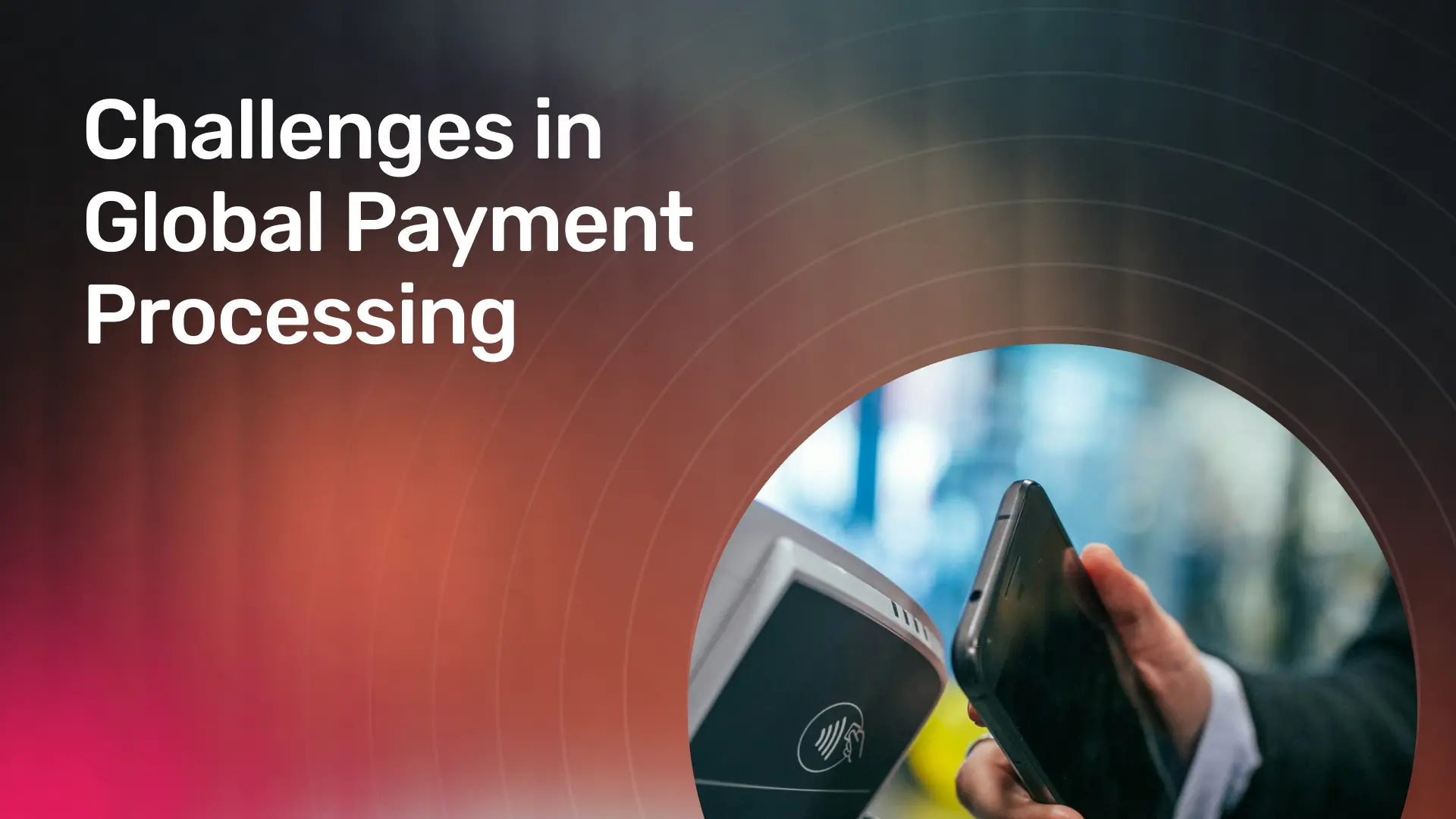Challenges in Global Payment Processing: Costs and Inefficiencies
Expanding a business across borders presents immense opportunities, but it also brings significant financial and operational challenges, particularly in payment processing. Companies navigating international transactions often encounter high fees, currency risks, regulatory complexities, and slow settlement times. These inefficiencies not only increase costs but also hinder cash flow and growth. In this article, we will explore the key challenges in global payment processing, examining how businesses can mitigate these obstacles to ensure seamless, cost-effective transactions.

What is global payment processing?
Global payment processing refers to the systems and technologies that facilitate financial transactions between businesses and individuals across different countries. It enables companies to send and receive payments in multiple currencies, ensuring seamless cross-border commerce. However, despite its importance in the global economy, businesses face numerous challenges that impact efficiency, cost, and security.
How does global payment processing work?
Global payment processing involves multiple intermediaries, including banks, payment gateways, currency exchange platforms, and regulatory authorities. When a business initiates an international transaction, the payment goes through a complex network of financial institutions, each adding layers of cost, regulatory checks, and potential delays. The entire process can vary depending on factors such as payment method, destination country, and compliance requirements.

The biggest challenges of global payment processing
Managing payments across multiple countries is a complex task that requires businesses to navigate diverse financial regulations, currency exchanges, and transaction fees. Here are some of the biggest challenges explained:
Currency exchange rates
Fluctuating exchange rates can significantly impact the cost of cross-border transactions. Businesses often struggle with unpredictable currency fluctuations, leading to higher costs and reduced profitability. Additionally, foreign exchange (FX) fees imposed by financial institutions can add to the overall expense.
High transaction fees
Processing international payments often involves multiple intermediaries, each charging a fee. Banks, payment processors, and currency exchange services all take a cut, making cross-border payments more expensive than domestic transactions. These costs can be a burden, especially for businesses handling frequent international transactions.
Slow transaction speed
Cross-border payments can take several days to complete due to interbank settlement processes, compliance checks, and differences in banking infrastructure across countries. The delays can disrupt business operations, causing cash flow issues and inefficiencies.
Regulatory compliance
Navigating the complex web of international financial regulations is one of the most significant challenges businesses face in global payment processing. Different countries have varying compliance requirements, anti-money laundering (AML) regulations, and tax laws, making it difficult to ensure full compliance without extensive resources.
Lack of transparency
Many businesses struggle with hidden fees and a lack of clarity regarding international transaction costs. Intermediaries often impose undisclosed charges, and businesses may not know the exact amount received by the recipient until the transaction is completed.
Technology integration challenges
Many businesses use legacy financial systems that are not compatible with modern global payment solutions. Integrating new payment technologies with existing systems can be complex and costly, leading to inefficiencies in payment processing.
Fraud and security risks
International transactions are highly susceptible to fraud and cyber threats. Hackers and fraudsters exploit vulnerabilities in global payment networks, leading to data breaches, financial losses, and reputational damage. Businesses must implement robust security measures to mitigate these risks.

Solutions and future trends of global payment processing
To stay competitive in an increasingly globalised market, businesses must find efficient ways to manage international payments. Traditional methods often come with high costs, delays, and regulatory challenges, but innovative solutions are reshaping the landscape. From automation to blockchain technology, companies now have more options than ever to streamline transactions and improve efficiency. Businesses operating in sectors with higher regulatory or financial risks can particularly benefit from specialised payment solutions for high-risk industry vendors that address unique compliance and processing challenges. Below, we explore the most effective solutions addressing the challenges of global payment processing:
Real-time cross-border payments
Advancements in financial technology are enabling faster, near-instant international payments. Real-time payment networks and digital wallets are reducing delays, improving efficiency, and enhancing the user experience.
Blockchain and DeFi solutions
Blockchain technology and decentralised finance (DeFi) solutions offer transparent, cost-effective, and secure alternatives to traditional payment processing methods. Cryptocurrencies and stablecoins facilitate borderless transactions with minimal fees and reduced settlement times.
Central Bank Digital Currencies (CBDCs)
Governments and central banks are exploring the development of digital currencies to streamline international payments, reduce transaction costs, and enhance regulatory oversight. CBDCs have the potential to improve financial inclusion and efficiency in cross-border transactions.
Advanced analytics and fraud prevention
AI-driven analytics and machine learning are helping businesses detect fraudulent activities and optimise payment processing. Predictive analytics can identify potential risks and ensure more secure and compliant transactions.
Strategic partnerships and collaboration
Collaborations between financial institutions, fintech companies, and regulatory bodies are paving the way for more seamless global payment solutions. Partnerships help reduce inefficiencies, improve compliance, and enhance overall transaction speed and security.

Preparing your business for the future of global payments
By embracing modern payment solutions, strengthening compliance efforts, and leveraging data-driven insights, companies can streamline their operations and reduce costs. Here are some key strategies to prepare your business for the future of global payments:
Embrace technology
Investing in digital payment solutions and automation can significantly improve the efficiency of global transactions. Businesses should stay up to date with the latest advancements to remain competitive.
Invest in modern payment infrastructure
Upgrading payment processing infrastructure ensures smoother transactions, better compliance, and enhanced security. Cloud-based payment platforms, APIs, and fintech integrations can help businesses streamline their payment workflows.
Prioritise compliance
Understanding and adhering to global regulatory requirements is crucial for businesses involved in cross-border payments. Working with compliance experts and using automated regulatory tools can simplify the process.
Explore alternative payment methods
Diversifying payment options can reduce reliance on traditional banking systems. Digital wallets, cryptocurrencies, and real-time payment networks offer more flexibility and cost savings for businesses.
Leverage data and analytics
Utilising data analytics to track payment trends, detect fraud, and optimise transaction processes can provide businesses with a competitive edge. AI-driven insights can enhance decision-making and improve financial management.

Why should you choose Native Teams for your global payments?
At Native Teams, we understand the complexities of global payment processing. Our platform offers seamless international payment solutions, minimising transaction costs, reducing delays, and ensuring full compliance with global regulations. With cutting-edge technology, secure payment infrastructure, and strategic partnerships, Native Teams empowers businesses to navigate the challenges of cross-border transactions with ease.
Ready to simplify your global payments? Join Native Teams today and experience efficient, secure, and cost-effective payment processing tailored to your business needs.
Read more about global payroll processing at Native Teams: Payroll Processing at Native Teams: Behind the Scenes
Conclusion
Global payment processing is essential for businesses operating internationally, but it comes with significant challenges, including high costs, slow transaction speeds, regulatory complexities, and security risks. Businesses often struggle with fluctuating exchange rates, hidden fees, and outdated technology, making cross-border payments inefficient.
To overcome these obstacles, emerging solutions such as real-time payments, blockchain technology, and central bank digital currencies (CBDCs) are reshaping the industry. Businesses can prepare for the future by adopting modern payment infrastructure, ensuring compliance, exploring alternative payment methods, and leveraging data analytics.
